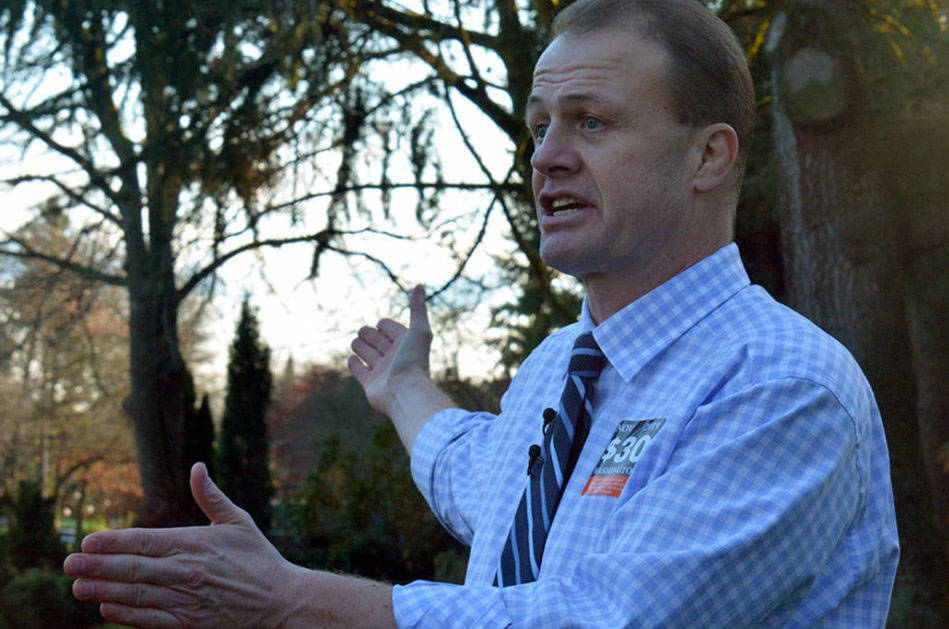The $2.6 million fine levied last week against Tim Eyman — longtime promoter of statewide ballot measures and himself — was hefty, but for Washington voters it was not the most significant part of a Thurston County judge’s order following his ruling that Eyman had made repeated violations of state law during his more than 20-year history of running initiative campaigns.
Superior Court Judge James Dixon, siding with the allegations of state Attorney General Bob Ferguson, found that Eyman had illegally moved funds between his initiative campaigns, failed to report hundreds of thousands of dollars in political contributions and had engineered a kickback scheme to shuffle donations from one organization to another, with the intention of payment to himself.
The violations, the judge ruled, were “particularly egregious” and “intentional efforts to conceal, deceive and mislead … and had a significant and material impact” on the public’s right to know where the money goes, who is behind the donations and who is in financial control of political campaigns.
Along with the fine, which under state law could have been as high as $7.8 million, Eyman is now barred from managing or directing the financial dealings for political committees, will have to form a political committee, independent of himself, to fund future campaigns and cannot directly solicit or accept contributions for himself or his family to support his political work. As allowed, he does already have his hand out for donations to his legal defense fund.
Eyman, who for years has made full use of email blasts to supporters and media, said he is considering an appeal but added that he would comply with the court-imposed restrictions.
“It is going to be interesting,” Eyman said. “I have to be sure not to step on any landmines laid out by the court.”
If these restrictions are landmines then they are landmines of Eyman’s own making, the result of his repeated refusals to follow state law and regulations that are meant to preserve accountability and a clear view into the financial support of political campaigns, disclosures that are expected of all candidates and ballot measure campaigns. And they are most important regarding “initiatives of the people” because that avenue for establishing state law was adopted for the exclusive use of the state’s citizens more than 100 years ago.
It is a right worth defending, but one that Eyman has used for his personal benefit more than for the good of the people of Washington state.
In his more than 20 years of involvement or direct control of initiative campaigns, Eyman has a dismal record of success.
Of the 17 initiatives that Eyman has successfully qualified for the ballot since 1998, voters have approved only two that were not challenged in court. Six were rejected by the voters; the other nine were approved by voters but were either fully or partially rejected by courts.
His second initiative, and the first under his direction, I-695 in 1999, sought a $30 cap on vehicle license fees, also known as “car tabs.” That initiative was approved by voters, but was rejected by the state Supreme Court the following year because, among other constitutional deficiencies, it violated the state’s rule that initiatives address only one subject. I-695 was successful only in that it cowed the state Legislature and Gov. Gary Locke into adopting the $30 cap, which ripped a hole in funding for state and local transportation projects and transit agencies that lawmakers still struggle to fill.
Twenty years later, it was Eyman’s most recent ballot effort — I-976, which again sought $30 car tabs — that was before the state Supreme Court. And again, an initiative pursued by the man declared the “initiative guru,” was rejected by justices for violating — wait for it — the single-subject rule and because its ballot title misled voters, another common Achilles’ heel for Eyman’s ballot measures.
For a “guru” with a 20 years’ experience, Eyman still appears not to grasp the state constitution’s requirements for initiatives.
And for all the outrage he has displayed after court rulings that went against him, Eyman, who calls himself an optimist, would pick himself up, dust himself off and file new initiatives, often with the same constitutional flaws, confident in the knowledge that he could continue to use the process for his financial gain, especially if the measures were rejected by voters or the courts.
For 20 years, Eyman has used “$30 car tabs” not as a policy goal but as a marketing slogan that supported his livelihood.
If Eyman is a guru, he has been the swami of directing his supporters’ ire against the courts and state officials who defeat or overturn his flawed initiatives, then unceasingly using that exasperation to raise money for his campaigns and himself.
Eyman insists that the judge’s ruling has placed unconstitutional restrictions on his First Amendment rights. It hasn’t. The judge put up guardrails that Eyman can no longer ignore. Those guardrails should keep him from concealing campaign financing and from using a vital public process for his own benefit.
But what will also help is a moment’s thought by his past supporters about whether to reach for their wallets when Eyman returns with his hand out.
–
This editorial was produced by The Daily Herald (Everett) Editorial Board. The Herald is a sister newspaper of the Mercer Island Reporter.



